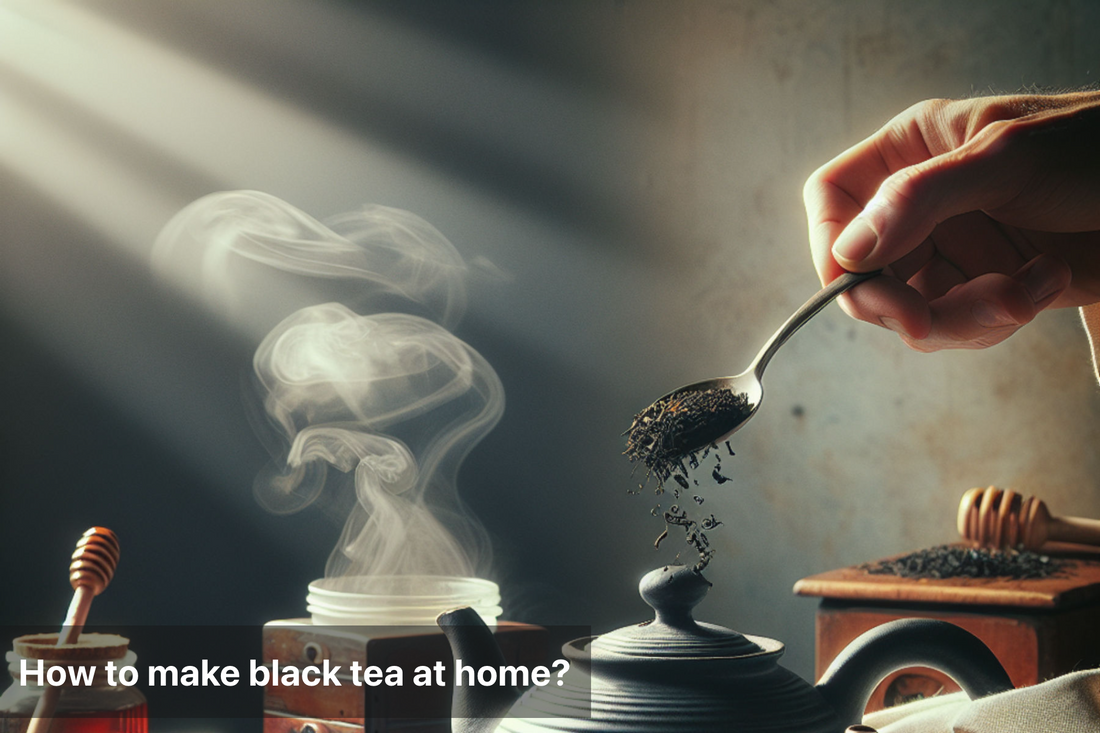
How to make black tea at home?
Share
Black tea is one of the simplest yet most widely consumed beverages across the world. Whether it’s sipped plain, with lemon, or spiced up with herbs, black tea is not only a morning essential for many but also a drink loaded with health benefits. Unlike milk tea, black tea is made without any dairy, offering a clean, bold flavor and greater antioxidant value. If you’re wondering how to make a perfect cup of black tea at home, you’re in the right place.
What Is Black Tea?
Black tea is a fully oxidized tea variety made from the leaves of the Camellia sinensis plant. The oxidation process gives the leaves their dark color and distinct, robust flavor. Popular types of black tea include Assam, Darjeeling, Nilgiri, Earl Grey, and English Breakfast, each offering its own taste profile. When brewed without milk, black tea offers a cleaner taste, fewer calories, and stronger antioxidant potency.
Ingredients Required
To make one cup of classic black tea, you need the following:
1 cup (250 ml) water
1 tsp loose black tea leaves or 1 black tea bag
Optional: 1/2 tsp sugar or honey
Optional: a few drops of lemon juice, mint leaves, or a cinnamon stick
You can adjust the quantities based on how strong or mild you prefer your tea.
Step-by-Step Recipe: How to Make Black Tea at Home
Step 1: Boil Water
Bring 1 cup of water to a gentle boil in a saucepan or electric kettle. For best results, always use fresh, filtered water.
Step 2: Add Tea Leaves or Bag
Once the water reaches a boil, turn off the heat and add the tea leaves. If you're using a tea bag, simply place it into the cup.
Use 1 tsp loose tea per cup for a strong brew
For milder tea, use slightly less or brew for a shorter time
Step 3: Let It Steep
Cover the pan or cup and let the tea steep for 3–5 minutes. The longer you steep, the stronger and more robust the flavor. Avoid over-steeping, as it can make the tea bitter.
Step 4: Strain or Remove Bag
Strain the tea using a fine mesh strainer into your teacup. If you used a tea bag, simply remove and discard it.
Step 5: Customize and Serve
Drink it plain for the purest experience, or add a dash of lemon juice, a few mint leaves, or a spoon of honey depending on your taste and health preferences. Serve hot.
Different Variations of Black Tea
1. Lemon Black Tea
Add a teaspoon of lemon juice after steeping. Helps with digestion and adds a refreshing twist.
2. Ginger Black Tea
Boil a few slices of fresh ginger with water before adding the tea leaves. A great remedy for sore throat and nausea.
3. Spiced Black Tea
Add a cinnamon stick, cardamom pod, or a clove while boiling water. This adds warmth and depth to the tea.
4. Mint Black Tea
Add 5–6 fresh mint leaves to the water or at the end of steeping. Perfect for hot weather or after a meal.
5. Iced Black Tea
Chill the brewed black tea in the refrigerator, add ice cubes and a slice of lemon. A healthy summer alternative to sugary soft drinks.
Benefits of Drinking Black Tea
1. Rich in Antioxidants
Black tea contains theaflavins and thearubigins—powerful antioxidants that help fight free radicals and reduce cell damage.
2. Supports Heart Health
Regular consumption may help reduce LDL (bad) cholesterol and improve overall cardiovascular function, thanks to its polyphenolic content.
3. Boosts Alertness and Focus
Black tea contains moderate caffeine (about 40–70 mg per cup), which helps improve focus and mental clarity without the jitters associated with coffee.
4. Aids Digestion
The tannins in black tea can help calm the digestive system and reduce symptoms like bloating or nausea.
5. May Support Weight Management
Drinking black tea without sugar or milk is virtually calorie-free and can be a hydrating alternative that keeps you feeling full between meals.
6. Regulates Blood Sugar
Some studies suggest black tea polyphenols may help improve insulin sensitivity and support stable blood sugar levels.
Nutritional Value (Per Cup of Plain Black Tea)
Nutrient |
Value (Approx.) |
|---|---|
Calories |
0–2 kcal |
Caffeine |
40–70 mg |
Carbohydrates |
0 g |
Sugars |
0 g |
Fat |
0 g |
Protein |
0 g |
Antioxidants |
High |
Adding sugar or honey increases the calorie count, but the base tea remains extremely low in calories.
Common Mistakes to Avoid
Over-steeping: It can make the tea bitter and overly astringent
Reboiling water: Always use fresh water to retain oxygen and flavor
Adding lemon to hot tea with milk: This can cause curdling—stick to plain black tea when adding lemon
Using very hard or chlorinated water: It can dull the flavor of the tea
When to Drink Black Tea
Morning starter: A gentle alternative to coffee to energize your day
Afternoon focus: Helps combat the midday slump and improves alertness
Post-meal: Especially helpful after oily or heavy meals for digestion
During intermittent fasting: As a zero-calorie drink that doesn’t break the fast
Cold weather: Add warming spices like ginger or cinnamon for a comforting effect
Summary
Black tea is a simple, timeless beverage that’s easy to make at home with just tea leaves and water. In under 10 minutes, you can brew a cup that’s rich in flavor, antioxidants, and benefits—without any need for milk or cream. Whether you enjoy it strong, mild, spiced, or citrusy, black tea fits seamlessly into almost every routine. It’s a great substitute for sugary drinks, supports wellness, and offers a comforting ritual in your day. Once you learn to adjust the strength and add your favorite twist, it’s likely to become your go-to cup—anytime, anywhere.






